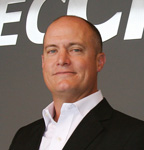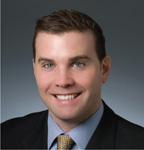
Mike Shull, President, SpecChem
Few industries have taken gut-punches quite like the construction sector since the big downturn hit in 2007. That was just after SpecChem launched with a line of specialty construction products—sealers, finishing aids, curing compounds and more.
Environments like that separate the Rain-maker from the guy standing outside getting drenched: SpecChem has averaged 40 percent annual compounded growth throughout that economic storm. Greg Maday, chairman and CEO, gives Mike Shull much of the credit for driving that growth, and Shull, in turn, cites Maday’s influence in creating
a culture that could lead to that success.
“I’m fortunate to go to work for my mentor,” Shull says. “Greg put me in a position to gain valuable exposure to the business elements. But more important, I watched him develop a culture and atmosphere. He taught me about the importance of creating win/win transactions, and the ability to make sure, in both my personal and professional relationships, that both sides are successful and sustainable.”
Those values, combined with an attack mentality, would come into play throughout the downturn. “Even when you look at how dysfunctional the economy has been over the past four years, it has presented us with a lot of opportunities while our competitors were playing defense,” Shull said. “They shut down some operations, laid off people trying to adjust to that environment, and that allowed us to play offense. We were able to hire people and expand our footprint.”
That’s a Rainmaker trait: Identifying opportunities where others can’t. “We try not to over- internalize our business,” Shull said. “Greg and I say that if you listen closely, your customers will tell you what to do with your market, sourcing and channel options.” When SpecChem bucked the trend to open in Dallas and Las Vegas, he said, “it was the right thing to do. It helped protect against the seasonality curve of our business.”
All soldiers, said Gen. George Patton, love the sting of battle, and Shull is no exception. He describes his own strengths as “probably being ultra-competitive, and having a good work ethic. I’ve always been extremely competitive, but if you’re also persistent and dedicated, you have the ability to lead and motivate other individuals. For SpecChem’s purposes, we had a very diversified and experienced team, and those teammates all shared some of those traits.”
And that, he says, begets rainmaking. Org-anizations thrive “when leadership stays committed to their plan, when leadership adjusts to the market, especially in the current market dynamics, and when leadership trusts its employees. Those companies are able to execute—they have good models or business plans, but the difference starts with leadership and the culture.”

Matt Condon, CEO, Athletic & Rehabilitation Center
Passion. Vision. And a willingness to ignore the consultants when they tell you it can’t be done. Matt Condon has drawn on those qualities and more with
the rise of the Athletic & Rehabilitation Center since he co-founded it in 2003.
The passion flows from his childhood in Iowa, where a family of seven athletic kids instilled in him a deep love for sports. The vision helped him recruit the kinds of employees who were integral to the company’s success.
As for the consultant? “It’s funny now to think about how strongly we were advised not to start ARC,” Condon recalls. “We were in fact told that it was a ‘saturated market with no growth opportunity.’” Undaunted, he and co-founder Kevin O’Rourke, now the CFO, were committed to bringing a completely new service standard to the market, Condon said, and “therefore, the historical market data and the competitive analysis felt irrelevant.”
Indeed: From two associates at the onset, ARC today has nearly 100. Patient visits, just a few hundred in 2003, are trending for more than 70,000 this year. And virtually every business line—from clinic visits to employment testing, on-site clinics and wellness services—has averaged at least 20 percent annual growth since the founding.
“Our success is reflected directly in the success of our clients in holding down health-care costs,” he said. To wit: The Kansas Department of Transportation, which saved nearly $300,000 in workers’ compensation claims for new employees in one year’s time. Counterpart MoDot slashed lost workdays from 3,000 to 937 in one year after enlisting ARC’s services.
Rainmakers often learn their skills from mentors, and in Condon’s case, that’s a considerable assembly: He cites his parents, his siblings, his wife, O’Rourke and the company’s staff and clients. In terms of executive development, he credits the influence of Burns & McDonnell’s chief executive. “Greg Graves has played a special role in the kind if CEO I am today—and the kind of CEO I would like to be someday.”
As someone who indeed built a business, Condon notes the tenor of this year’s presidential race and observes, “the funny thing about any criticism placed on entrepreneurs is that they—we—generally don’t take the time to notice it,” he says. They’re too busy getting it done. “Most entrepreneurs experienced doubt from others at their company’s inception, and started it anyway. Most entrepreneurs were told they couldn’t grow their company, and they did it anyway. Most entrepreneurs are reminded daily about pessimism in the economy, concern about the market, dangers in politics, etc., and they push forward anyway.”
Entrepreneurs, he says, “grow because they know they can, they believe in their people, and they know their supporters will stand by them regardless of the outcome … that is a powerful combination.”